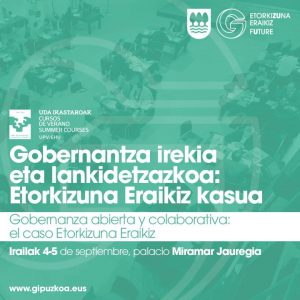“Etorkizuna Eraikiz responds to the need of changing the way of making policy to be closer to people” Markel Olano, General Deputy of Gipuzkoa
The need to look for new ways, implement changes in our political culture, adapt values and basic and attitudes in the day-to-day in our organizations –in an increasingly complex environments, and the urgency to identify answers that respond to the future challenges forces us to, from a transformative vision, rethink our mental framework and the exercise of power.
Etorkizuna Eraikiz. Building a better future for Gipuzkoa
Etorkizuna Eraikiz is a strategy and large-scale program of the Provincial Government of Gipuzkoa. It was born as a new system of governance for the Provincial Council to make relationships and work with the Gipuzkoan society (associations, companies, knowledge network and citizenship of the territory).
Etorkizuna Eraikiz is also a new platform to give answers to the new challenges that Gipuzkoa faces. A new model to detect, design and experiment today, in Gipuzkoa society, the social and economic challenges that we will have to face in the future.
Through shared deliberation, it is pretended to face the new demographic, economic, social, productive and environmental challenges, from the defence of the wellbeing and the sustainability of the territory. In this process of deliberation, organizations, companies, associations, universities and civil society have taken part.
Through the active experimentation projects, it has been possible the cooperation of different agents working together to offer solutions adding knowledge and experiences for a sharing future.
For more information: Etorkizuna Eraikiz
The Provincial Government of Gipuzkoa is involved in a process of search for shared legitimacy, in which it is recognized that government action has ceased to be self-sufficient, which forces to act horizontal and networked with all social and institutional actors.
It is therefore urgent to reflect and give responses to questions, such as: What should change so that the relationship of detachment by the citizenry evolves towards a greater confidence and involvement in identifying and solving the challenges that we face? What are the main characteristics of a new governance?
 To answer these questions, the Provincial Government, that goes for a new way of governance more open and collaborative proposed within Etorkizuna Eraikiz program, has organized this Summer School on September 4th and 5th in Donostia-San Sebastian.
To answer these questions, the Provincial Government, that goes for a new way of governance more open and collaborative proposed within Etorkizuna Eraikiz program, has organized this Summer School on September 4th and 5th in Donostia-San Sebastian.
For two days, leading, both international and local, experts and specialist from the governmental, social and academic field had the opportunity to discuss the pillars, barriers and drivers to boost a new model of governance that it is based on the co-design, co-experimentation and co-evaluation with all the agents of society and citizenship.
In order to lead the discussion, the Provincial Government of Gipuzkoa focused the debate on Etorkizuna Eraikiz program which searches to define the future of the territory on the basis of a “new governance”.
In these days, some emerging topics were put on the agenda, topics such as:
- The Political Disaffection of society. Loss of Trust. Confidence problems of the citizens in the institutions and the leaders. It is certainly very complex to act in the public without trust.
- Crisis of the system and of the way in which the elements of the public sector and the society have been related.
- The weakness of the institutional system. Reflecting on the essence of the “public”. It is necessary to create a new narrative.
- The open and collaborative Governance. The necessity to connect different knowledge.
- Current Stage characterized by complexity and uncertainty.
- Cultural Change in our society.
- Private-Public relations
- Transparency. Accountability
- The Challenges of Territories. Exchange of knowledge.
- The Sustainable Development Objectives. Universal common program globally by 2030. Integration of diversity into public decision-making.
- The essence that it is not possible to attend to social needs.
- A new concept of citizen. The subject of rights and obligations, democratic and co-creation of rights.
- Resilence-governance binomial.
- The keys to the new governance. Active experimentation.
From the lectures and the reflections given in the spaces for debating a set of challenges, that the new governance is facing, were arising. Some of them are:
- Insert the academy into the design and implementation of the public policies.
- Citizenship partnership. Creating spaces where citizenship is more comfortable and keen to debate.
- Connecting with the most advanced experiences across the world and being part of the global vanguard.
- Creating a new narrative of the public. Defining which the objectives of the public policies are.
- Improving the trust of the citizens by transparency.
- Need to generate alliances. The complex and global problems can’t be tackled down unilaterally.
- Internalize the need to work under principles of new governance within the institutions.
- Capturing and retaining talent in management.
- It is necessary to create a new administration: connected, innovative, reflective, open, integrative and participative.
- Public servants providing democracy, that is, guarantee of the rights.
- Pro-activity of the Administration (efficiency and effective)
- The big challenge of our societies is the coordination of activities.
Highlighted sentences
“We are facing an achievable dream. To make of Gipuzkoa one of the territories with less inequality in the world. We can only go forward if we work together, in “auzolan”, as our Gipuzkoan DNA and our tradition show us”. Markel Olano.
“There is not a circumstantial, economic or governance crisis, but it is the system what it is in crisis. The omnipotent state is dead. The State does not have the capacity to meet all social needs.”Manuel Arenilla.
“The public is today a big collective challenge.”.Laura Gallego.
“The most important thing of opening a participation process is the political will of the authorities that have legitimacy”. Ariel Ramírez
“A shared vision based on co-responsibility between citizens, authorities and organizations is needed.” Lorena Pulido
“Public-private collaboration has to be understood as a long-term relationship and therefore has to be constructed as such”. David Van Slyke
“The debate on the future must begin today to create a platform for everyone to contribute their ideas”. Matt Ryan
“Open Governance is asking for a new context, a context where everyone could speak and listen to each other”. Julien Defait
“We have to open up and ask society, and also assume that this implies a loss of power, implies a deconstruction of our own system to address a dialogue with the environment and deconstruct new processes, Etorkizuna Eraikiz is the way to approach this”. Xabier Barandiarán.
“The future of politics involves the creation of interactive processes that stimulate the exchange and communication between diverse agents”. Imanol Lasa
In this summer school, among the Magister Lectures presented by international experts as John Donahue (Harvard Kennedy School), Manuel Arenilla (INAP) and David Van Slyke (Maxwell School of Citizenship and Public Affairs) there was also the opportunity to contrast Etorkizuna Eraikiz program with advanced experiences presented by some experts from Australia, Colombia, United States, France and Chile.
About the Summer School
Open and Collaborative Governance: the case of Etorkizuna Eraikiz
Speakers. The General Deputy of Gipuzkoa, Markel Olano; the director of INAP, Manuel Arenilla; the professor of Harvard University, John Donahue; the Director of the Center for Policy Analisis of Medellin, Laura Gallego; the director of the School of Governance and Public Administration of the INAP Chile, Ariel Ramírez; Distrito Tec of University of Monterrey, Lorena Pulido; the head of the Cabinet of the General Deputy, Xabier Barandiaran; the dean of the Maxwell School of Citizenship and Public Affairs of Siracusa University David Van Slyke; and the head of design for Public Innovation in de 27e Region (Paris), Julien Defait.
Date: 04- 05 September 2017
Venue: Palacio Miramar-Donostia-San Sebastián
